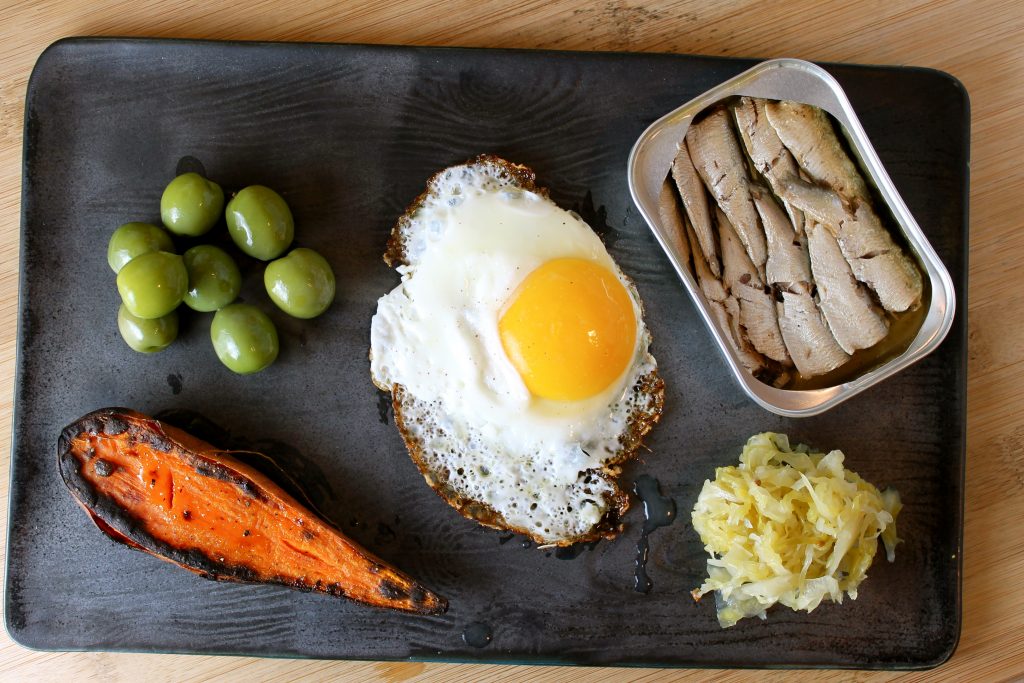

Let’s assume you’re no cook, or don’t have any desire to cook. Let’s also say that you’re the busiest man on earth and you don’t have any time for cooking. Maybe you like the minimalistic approach when it comes to food preparation. Even if you fall under all of the criteria above I assume you have a kitchen, refrigerator and a stove.
I also assume that if you read this blog you know how to make an over-easy egg. If not, please stop reading and go learn.
Now. What is the best easiest way to prepare a paleo meal? What are the food items that you just have to have in any given moment? I picked 5 items that for me work together to create the quickest, most efficient and nutritious paleo meal to prepare.
Eggs
No coincidence here for being number one. Eggs are one of nature’s greatest food-gifts to us. The perfect most bio-available protein and fat source encased in a shell and ready to eat just after short and easy cooking. If you haven’t read it yet please go to my eggs post. After decades of being demonized as cholesterol raising, heart disease causing and such fallacies, science has come back to its senses – eggs are one of the most nutritious foods we have available. And what a culinary pleasure.
Sardines
The oceans offer us the last real wild foods. Probably not for much longer. Wild fish populations are dwindling all around the world. But wild sardines are thriving. Like eggs, canned sardines are also treasure in a can. It can’t really get easier than this. Just open one. I usually mix sardines with a salad, a lot of fresh squeezed lemon juice and extra virgin olive oil. Works fine with avocado as well. On a busy day that is my favorite lunch. For more information about the health benefits and which kind to buy go to my post about sardines.
Fermented vegetables
If you’re not a salad person, and don’t have the time or the motivation to make a salad, fermented vegetables are a must item for you. Actually they’re great even if you eat a salad every day. If you can make fermented vegetables yourself it’s great But they are more available today than ever, ready to buy from your food store. We’ve being bombarded recently by new information about the health benefits of fermented vegetables and fermented food in general, and how they’re crucial to our micro-biome. In short – fermented foods support the good bacteria population in our gut; something that is dramatically important to our health. Also- the fermentation process, which for us is basically a pre-digestion process, enhances the nutritional value of the vegetables we choose to ferment. Start with sauerkraut, which is the classic German fermented cabbage.
Yams and Sweet Potatoes
A healthy, easy to prepare and cheap source of carbohydrates. Yams are a good source of beta-carotene, some B vitamins and minerals like potassium and manganese. In the context of paleo eating as I see it, it’s important to keep carb levels on the lower side so keep that in mind. On days of high intensity training or heavy weight lifting I tend to eat more of these. On lighter training days or no-training days I eat minimal carbs. The quickest way to prepare yams is to cut them into 2inch cubes and steam them. Steaming helps preserve the nutrients in the root as opposed to boiling which make the nutrients leach into the water. If you’re not in a hurry, baking will turn yams into a real delicious treat. Bake them whole on 400f. When they’re soft, after about an hour, cut across into two halves and add a generous amount of grass-fed butter. Life will feel a little better.
Olives
Olives are another nutrient dense food ready to eat at any time. Olives are a fat-rich food and 80% of their caloric value comes from fat. Their fat profile is unique in that it is mostly mono-unsaturated fat or oleic acid. Mono-unsaturated fat has been known to decrease the risk for heart disease by improving the HDL-LDL ratio, and lower blood pressure. A more recent research shows us that olives are nothing but a phytonutrient bomb, loaded with a huge amount of beneficial antioxidants and other anti-inflammatory components.
Coming from the Mediterranean I have great respect for olives, which are actually a fruit, and the trees they grow on. An olive tree can grow and live for hundreds of years. Looking at these trees makes you really appreciate this ancient food source that has sustained the people of the Mediterranean for millennia. Olives will add some bitterness and punch to the rest of the ingredients I mentioned. I prefer not to buy olives that were pitted because they lose a lot of their freshness. Don’t be lazy and do it your self. Remember that freshness is superior to convenience.



